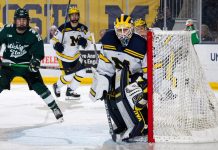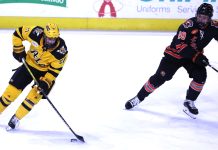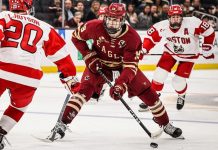All involved knew it would take time. How long was anyone’s guess.
And while the Harvard Crimson (4-2-1, 2-2-1 ECACHL) are not the team it envisions becoming as the season progresses, the defending ECAC tournament champion is on a roll. Winner of four straight, the Crimson believe things are starting to fall into place.
“We knew it would take time to gel,” rookie sensation Jon Pelle said this week. “It’s a pretty good feeling. We have a lot of talented guys.”
A home sweep of Yale and Princeton gave the club its first league wins and a bit of confidence that set them up for their most impressive wins to date — a 3-1 upset of then-No. 1 Boston College and a 2-1 road win at No. 11 Boston University.
It marked the first time Harvard had beaten both BC and BU in the same season since 1999 — the same year that last witnessed the Crimson winning its first two nonconference games.
“Obviously, it’s a big win for us,” said goaltender Dov Grumet-Morris after turning aside the Terriers. “Crosstown rivals, we’re always in competition with them during the regular season and postseason and the Beanpot, as well as in recruiting battles, so it helps our prestige.”
It also helps one other area.
“It’s big for our confidence,” admitted Harvard coach Ted Donato. “BU and BC are great hockey programs. I try to balance it because it’s two hockey games, and it’s early. But for our guys, these are big rivalry games and fun to play.”
It was the captain of the Crimson who put things into perspective, though.
“At the end of the day,” said Noah Welch, “we’re still a young team, and we’ve got a ways to go and a lot to learn. We did knock off two really good teams. I don’t know where it puts us in the rankings, and as a captain, I really don’t care. It just puts added pressure on a young team. I’m just glad with how the guys are playing right now.”
As well he should be. The Harvard defense, which regularly skates six NHL draft picks, has been the strongest part of the team.
“From the goalie on out,” said Pelle, “they are so solid out there.”
Aside from a six-goal hiccup against Princeton — a game the Crimson still won, 8-6 — and the four put up by Colgate, the Crimson blueliners and Grumet-Morris have combined to allow just seven goals in the team’s other five contests, for an average of 1.4 goals per game while going 3-1-1.
“Our defense is as solid as any in the country,” said Donato on Wednesday. “It’s a good mix of size and skill and they utilize each other’s strengths. Leadership-wise, they’re able to settle things down. Even when we don’t play well, they can keep us in they game until the offense comes around.”
Between the pipes, Grumet-Morris is again having a quietly solid season. He’s played every game thus far — a trend not likely to change anytime soon — and has a 4-2-1 record with a 2.27 goals against average (GAA) and .923 save percentage.
But he means more to the Crimson than the numbers can explain.
“Dov’s been superb,” said Donato. “He’s an excellent goaltender and the fact that he’s backstopped the team into the NCAAs for three years shows that. It’s nice to see him get credit for his play when we get the chance to beat teams like BU and BC.
“It makes a coach’s job easier knowing that you don’t have to worry about your goaltending.”
The Crimson’s defensive play, which extends up to a group of responsible forwards, earns praise from opposing coaches as well.
“First of all, they’re a very quick team,” said BU’s Jack Parker. “I don’t know if they were this quick last year. They’ve got good size on defense, and that can make you a good defensive team because … you can keep the pressure on and forecheck well and keep the puck down in the other team’s end, which they do well. [W]hen you’re in their end, they can defend in front of their goaltender a little bit better because of their size.”
As for the offense, that’s where the Crimson have struggled the most this season — averaging just 2.7 goals per game. The saving grace, however, has been the team’s performance on the power play, where Harvard has scored 11 of its 19 goals.
The first unit, made up of Pelle, Welch, Andrew Lederman, Tom Cavanagh and Brendan Bernakevitch, has been lethal. The group combined for all three tallies against the Eagles and the tying marker versus the Terriers. In all, they have nine power play goals.
“They have allowed us on the power play,” said Donato, “to have a lot of options. If one of our guys gets extra coverage, we have other opportunities.”
In other words, opponents can no longer double-team Cavanagh, Harvard’s best player, as they did last season. Especially since all five skaters have at least one extra-man goal, including three each for Lederman and Pelle.
And while the Crimson are getting the expected production from Welch (1-4-5), Bernakevitch (1-6-7) and leading scorer Cavanagh (3-6-9), the emergence of the diminutive Pelle (4-3-7) and the veteran Lederman (3-3-6 after posting 11 total points in three previous seasons) has been the difference thus far.
“They’ve been big lifts,” said Donato. “Pelle’s a very smart hockey player. With his size, he’s not going to be bullying his way into situations, but he has no fear going to the net for scoring chances.
“Lederman might be the best story in college hockey. It is a credit to him that he stayed in shape [after playing only seven games last season]. He’s very noticeable in practice. He has an ability to score that you can’t teach. There were parts of his game that he needed to improve so that he could showcase his skills, and he’s done that.”
Admittedly, though, Donato recognizes that the area of greatest transition has been the offense — away from Mark Mazzoleni’s more conservative style and to the up-tempo game the rookie coach wants his club to play.
“It’s a learning process,” Donato explained. “You have to realize that we’re not just talking about six or seven freshmen coming into a style that everyone else knows. It’s 20-25 guys going completely into a new system and a new coaching staff. We’re not able to have exhibition games to get the kinks out.”
At least not in the sense that Donato is used to from his NHL days. ECACHL teams often have only a week of preseason practice with their coaches before games begin. With Ivy League teams, it’s usually only two days. As a result, Harvard’s two exhibition games were not enough.
“At times, I feel like I’m over-burdening them,” admitted Donato. “So what we try to do is spend time each week giving them the structure. Teach the system and the basics and then try to tweak it.”
Indeed, everyone is learning on the job, including the coach.
With each game the Crimson play, Donato gets more comfortable in his new role and the players get more adjusted to him.
“It’s definitely a different atmosphere in the locker room this year,” said Welch. “It’s a little more loose and more enthusiastic. We have a young team, and we kind of approach every game as if we don’t have anything to lose.
“A young team and new coach, we’ve just got to go out and play. It’s less tense, more enthusiastic, more fun. Guys are having fun playing now, and that’s why we’re playing so well.”
Those are comments that were rarely heard over the last few seasons in Cambridge. Even so, there’s no arguing Mazzoleni’s success in his short time behind the Harvard bench. He raised the bar back up for a program that had struggled in the mid- and late-1990s and left Donato with big shoes to fill.
“Every game has been a new chance to learn something,” explained Donato. “The one big thing I’ve learned is that sometimes how I react and carry myself on the bench can definitely have an effect on the other guys. I’m trying to be less emotional.”
So far, it’s paying dividends both on the ice and in the locker room.
Vermont Hits Speed Bump
All is going well for coach Kevin Sneddon’s Catamounts.
They own the nation’s longest unbeaten streak (6-0-3), having not lost a game since before Halloween, and are undefeated in ECACHL play (4-0-2). They have not allowed more than three goals in a game since October 22 and have given up three or more just four times all season.
But this week came news that assistant captain Brady Leisenring, third in scoring (3-6-9) despite having played in only six games, will sit out the remainder of the season with recurring groin strains. The senior plans to apply for a hardship waiver so that he may carry over his final year of eligibility into next season when the Cats debut in Hockey East.
As a result, Leisenring has played his final ECACHL game.
“After meeting with our medical staff and Brady and his family,” explained Sneddon on Wednesday, “everyone agrees that applying for a hardship waiver is in Brady’s best interest, as well as the best interest of the program.
“In the short term, not having him in the lineup hurts, but in the long run, the notion of having a healthy Brady next season is certainly something to look forward to.”
Leisenring has missed eight games this season and UVM has gone 3-3-2 in those contests. Sneddon isn’t worried, though.
“This team has been built to run on the sum of its parts,” he said, “and not on any one individual. Despite missing Brady these last few games, our team has shown that they can defeat some of the best teams in the country.
“Each player will have to step it up a notch within their role in order for our team to continue to play well.”
Leisenring is expected to make a full recovery in time for the beginning of next season.
Baby Bears Lead the Way
Harvard wasn’t the only team to recently record an upset of a ranked opponent. Travel partner Brown turned the trick out west when it upended then-No. 8 Minnesota-Duluth on Saturday on a goal scored with 0.1 seconds left on the clock.
Leading the way for coach Roger Grillo’s squad was a trio of Baby Bears — rookies Jeff Prough, Sean Hurley and Adam D’Alba. Prough’s last-second slapper was the difference against the Bulldogs, while Hurley assisted on both goals and D’Alba made 44 saves.
Hurley, a defenseman, is tied for the team lead in points (six) with sophomore Brian Ihnacak, and posted three assists on the weekend in Duluth. D’Alba, meanwhile, was stellar in winning his first collegiate start. He made 33 saves through the first 40 minutes and helped Brown kill all seven shorthanded situations.
In all, seven freshmen are in the Brown lineup on a regular basis, not including D’Alba, who may now see more time between the pipes. Of those rookies, three — Hurley, David Robertson, and Paul Baier — are regular defensemen.
Jessiman Back in Hanover
After surgery in New York to fix his injured ankle, Dartmouth junior Hugh Jessiman is back with the Big Green — albeit on crutches and watching from the stands. The talented forward took in his team’s overtime victory over Cornell on Saturday with friends and family, and gave an assessment of his health after the game.
“Much better now,” he joked after the contest. “Actually, I’ve been feeling better all week. The pain is pretty much gone now.”
Soon he will begin a lengthy rehabilitation process. Doctors have told him that it would be 14-16 weeks after the operation before he could start skating again.
“Around the beginning of March,” Jessiman said with regard to his timetable. And while he was adamant about returning sooner before he went in for surgery, he’s a little more tempered in his assessment now.
“It all depends on rehab and how hard I work. And I’m determined to work extremely hard. The other part is how the ankle reacts.”
In the meantime, he’s forced to sit and watch.
“The toughest part of the day,” Jessiman admitted, “is around four o’clock when you put your suit on … when [roommate Grant] Lewis heads out the door.”
But the Connecticut native is trying to keep busy and find the silver lining in his long road back.
“I really like watching the games. I get to see it from the fans’ point of view. Grant even asked me to watch him play, so I’ve been giving him some notes.”
Jessiman’s absence has meant an adjustment period for the Big Green as well, as head coach Bob Gaudet looks to mix and match his lines until he can find some chemistry up front.
“It’s giving the younger guys a bit of experience,” said Jessiman about his absence. “This is a tough team. We’re facing a bit of adversity, but you can’t just throw up your arms. We need to find a way through it.”
National Numbers
In a season of surprises and one in which the ECACHL is once again making some national noise, many players from the league can be found in the top ten rankings in many statistical categories. Here’s a list of players, by team, that are on the leader board going into this weekend.
Clarkson — Mac Faulkner, two shorthanded goals (t-2nd).
Colgate — Mike Campaner, 11 assists (t-8th).
Cornell — David McKee, 1.38 GAA (2nd), .941 save percentage (4th).
Dartmouth — Dan Yacey, 1.61 GAA (5th), .934 save percentage (9th).
Princeton — Patrick Neundorfer, five power play goals (t-8th).
Rensselaer — Kevin Croxton, 19 points (t-2nd), 13 assists (t-4th); Nick Economakos, 14 assists (t-2nd), 18 points (t-6th); Kirk MacDonald, 10 goals (t-3rd), six power play goals (t-4th), 17 points (t-10th).
Union — Jordan Webb, eight power play goals (1st), 11 goals (t-2nd); Justin Mrazek, 1.62 GAA (6th), .937 save percentage (6th).
Vermont — Scott Mifsud, six power play goals (t-4th), nine goals (t-6th); Joe Fallon, two shutouts (t-2nd), 2.01 GAA (9th).
On the team end of things, the ECACHL is also well represented. RPI ranks sixth in the nation in offense (3.85 goals per game). Defensively, the Big Red lead the nation in fewest goals allowed per game (1.38). They are followed by the Big Green (2.00), tied for second, and Colgate (2.25) in the fifth spot.
In special teams play, four ECACHL clubs are in the top ten, but most would be surprised at who is leading the way. The Tigers are tops in the nation on the power play (27.5 percent), followed by Harvard (24.4) fifth, the Engineers (22.9) eighth and the Dutchmen (22.5) ninth.
On the penalty kill, Dartmouth is second in the country with a 90.6 percent effectiveness, followed by Cornell (89.4) seventh and the Catamounts and St. Lawrence (86.7) tied for tenth. The Saints can also be found among the leaders in shorthanded goals, ranking in a tie for second with five. The Raiders are tied for seventh with four tallies.
In Case You Missed It …
• Brown’s upset of Minnesota-Duluth was the Bears’ first road win against a ranked opponent since last November.
• Clarkson has scored the first goal in just three of its 11 games.
• The Knights have not allowed a power play goal in three straight contests, killing off 13 opportunities.
• Colgate’s win at Dartmouth was the Raiders’ first in Hanover since the 1999-00 season.
• Colgate has won five of its eight one-goal games this year.
• Cornell has allowed two or fewer goals in its first eight games, a streak surpassed only by Ned Harkness’ 1965-66 squad that allowed 11 goals in the season’s first nine games.
• Dartmouth’s win Saturday was its first in overtime since November 2002.
• The Big Green is only 3-4-0 when outshooting opponents.
• Harvard’s win over Boston College was its first against the Eagles since January 1999.
• Princeton defenseman Luc Paquin leads the nation’s blueliners with 1.38 points per game.
• Rensselaer is 5-1-0 when scoring first and 6-0-1 when leading after two periods.
• St. Lawrence’s win over Clarkson was the Saints’ fourth straight victory over their rivals in Appleton Arena.
• The Saints are 0-6-1 in their last seven games following a Clarkson match-up and have not won a post-Knights game since February 2000.
• Union’s six-game winning streak is the best in the nation.
• With 99 career points, the Dutchmen’s Jordan Webb needs six more points to become the all-time Division I points leader at Union.
• UVM’s unbeaten streak of nine games is the program’s longest since its 1995-96 Frozen Four season and its league start is the best since opening 8-0-1 that same year.
• Vermont had not taken three of four points from a Colgate/Cornell weekend since February 1997.
• Yale has lost 15 straight games dating back to February, including the last three and five of its last eight by 5-2 scores.
• Seven players were ranked among the NHL’s top prospects by Central Scouting recently. Cornell defenseman Sasha Pokulok (8th), Yale’s Blair Yaworski (12th), RPI’s Andrew Lord (21st) and Harvard’s Ryan Maki (28th) represented the skaters. UVM’s Joe Fallon (1st), RPI’s Jordan Alford (3rd) and Dartmouth’s Sean Samuel (4th) were listed in the goaltending category.
That’s all for this installment. Here’s wishing you and yours a healthy and happy Thanksgiving weekend.
Thanks to Scott Weighart for his contributions to this column.


